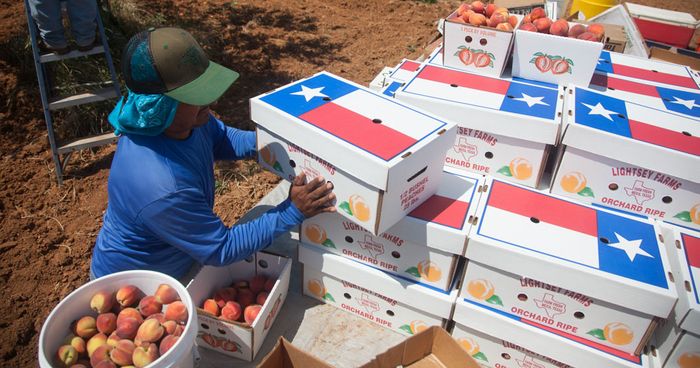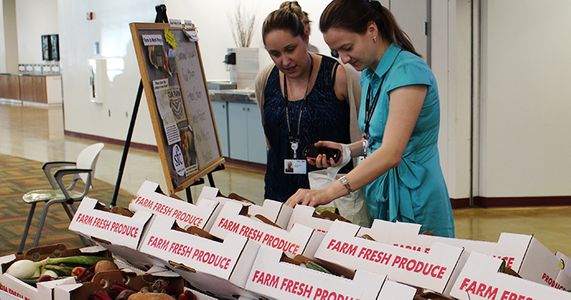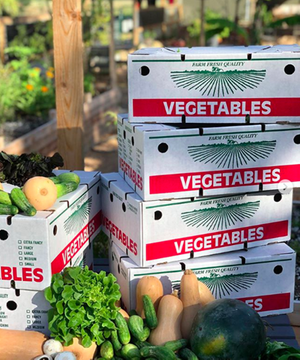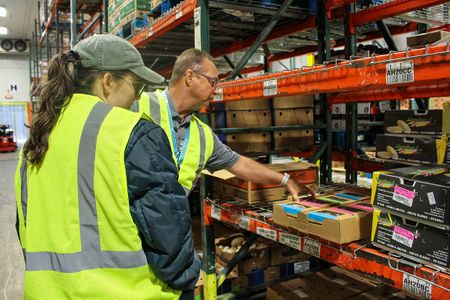Value Chain Coordination

Value Chain Coordination
Our dedicated Value Chain team strengthens Texas’s food system by fostering collaboration between producers, buyers, and all stakeholders involved in the procurement, marketing, and distribution of local food. By building trust and strong relationships with farmers, schools, grocers, and food hubs, we seamlessly connect buyers and producers, empowering farmers to thrive in the wholesale market. Together, we bolster the production and availability of locally grown, sustainable fruits and vegetables across Texas.
What Is A Value Chain?
A value chain is the set of activities and processes involved in the production, marketing, and distribution of food. Value chains are designed to equitably create, increase, and share profit, knowledge, and other resources for all actors and participants, not only the end consumer.
Who Is In A Value Chain?
A value chain includes everyone involved in bringing a product to market. In the context of agriculture, a value chain includes farmers, ranchers, processors, distributors, retailers, or institutions.
Why Value Chains Are Important
Value chains create a more sustainable and equitable agricultural system. By working together, producers and other value chain partners produce higher-quality products, reduce environmental concerns, and create a food system that benefits all stakeholders.
Some of the key benefits of a value chain are:
- More value-based products. Value-Based products are produced with a focus on social, economic, and environmental commonly-held values. These products are often more sustainable, nutritious, and ethical than conventional products. Some examples of these values are organic or pesticide-free produce, products grown on farms that have fair labor practices, and products grown or raised using practices that minimize the negative impact on the environment.
- Strong local agricultural center. By supporting local farmers and producers, value chains build a more resilient and sustainable food system. A food system that reduces reliance on monoculture systems, creates an efficient regional supply chain, and a social safety net that can withstand unexpected events that impact food production, distribution, and availability.
- Health benefits for the community. By increasing the availability of nutritious, locally grown foods, value chains shorten the distance between communities and stores selling foods beneficial to community health.
Overall, value chains are an important tool for creating a more sustainable, equitable, and healthy agricultural system.
Learn more about our value chain work:

Farm to School Learning Collaborative
In partnership with Texas Farm Fresh, SFC is cultivating a statewide learning community of school nutrition staff interested in expanding their farm-to-school programs. The Farm-to-School Learning Collaborative creates an opportunity for peer-to-peer relationship building, knowledge sharing, and resource creation. Sign up today for the Farm to School Learning Collaborative.

Farmer Wholesale Readiness
In partnership with the National Center of Appropriate Technology and Foodshed Investors, SFC provides wholesale readiness training and technical assistance to small-scale farmers and ranchers. Farmer Wholesale Readiness works with an average of 10 Texas farmers per year to build their farm businesses and grow into wholesale markets, resulting in a 33% average increase in annual gross sales. To learn more about Farmer Wholesale Readiness and how to join the cohort, email farmers@sustainablefoodcenter.org

Matchmaking and Convening
SFC fosters connections and promote local sourcing within the food system through matchmaking and convening events. SFC’s Central Texas Food Supplier Convening successfully brought together institutional purchasers and wholesale distributors to discuss the specific local products that schools were interested in purchasing while addressing barriers hindering local procurement. SFC’s Chef-to-Market Event introduced Austin-area chefs to local producers at the SFC Farmers’ Market Downtown to showcase local farm businesses and products and bolster the local food economy. To learn more about SFC’s matchmaking and convening events, email farmers@sustainablefoodcenter.org

Policy and Advocacy
SFC advocates for policy changes that support more local purchasing. In Fall 2022, SFC launched a multi-partner advocacy campaign for the City of Austin to adopt a Good Food Purchasing Policy, which would ensure transparent supply chains and continual improvement for institutional buyers. Learn more about our current policy campaigns and actions.
